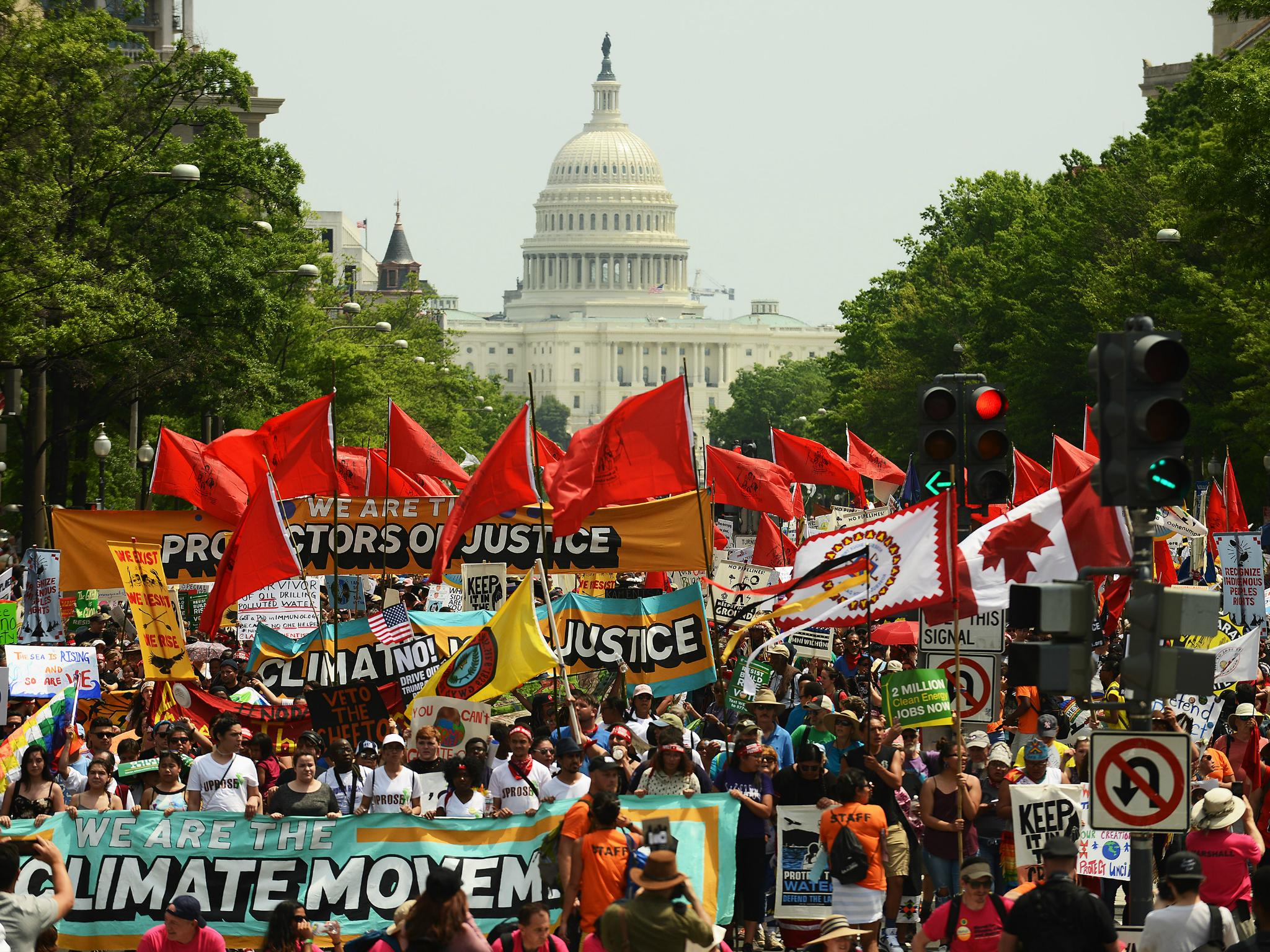Paris Agreement: Over a thousand US CEOs and mayors say they will continue to fight climate change despite Trump
They call Donald Trump's withdrawal from the agreement 'out of step' with the country

Over a thousand mayors, businesses, investors, and academic institutions have signed a pact to continue fighting climate change in the US despite Donald Trump’s withdrawal from the Paris Agreement.
Last week, Mr Trump pulled out of the Paris accord, stressing that it puts American workers at an “economic disadvantage” and that it is “unfair” for the US economy.
The “We Are Still In” initiative represents $6.2 trillion of the US economy - composed of bipartisan “drivers of the real economy,” Lou Leonard, World Wildlife Fund’s Senior Vice President of Climate Change and Energy, told The Independent.
Several business leaders including managers of multi-billion dollar pension funds, the CEO of Shell, and former Exxon Mobil CEO and Secretary of State Rex Tillerson had urged Mr Trump to stay in the Paris accord.
Twenty Fortune 500 companies, including Apple, eBay, Gap Inc., Google, Intel, Microsoft, Nike, and several universities are among the signatories to the initiative as well.
It is a wide cross-section of the US, all coming together to say Mr Trump’s decision is “out of step” with what is happening outside of Washington.
“The signers all understand that the Paris Agreement is a blueprint for job creation, stability and global prosperity...to create jobs, spur innovation, promote trade and ensure American competitiveness,” they said in a statement.
Mr Leonard said that though these cities would be able to combat climate change “faster and more fully” with the help of state and federal governments, the wide variety of partners in the initiative is important to note.
These new partners can “do something creative” to green their local economies, said Mr Leonard.
He explained that the reason the initiative is crucial is that decisions about transportation, ports - some large, international shipping hubs, urban planning, and land use are all made at the local government level.
These are the areas where changes need to be made to push the US to a “zero carbon future,” Mr Leonard said.
Some mayors and companies that signed on are in states that have not committed to fighting climate change. Only 13 Republican and Democratic governors have done so thus far.
Mr Leonard said though that may be an issue, policies about “sustainable agriculture, for instance, become less and less political at the local level.”
For instance, he pointed to the number of mayors and actors representing the Mississippi River Valley, “the breadbasket” of America that runs through several Republican states, as evidence that local leaders understand climate change’s economic impact better than most.
In addition to this initiative, 211 mayors from around the country have signed a similar pledge to “create a clean energy economy,” according to a statement from Mayors National Climate Agenda.
Cities represented include San Diego, California and Miami Beach, Florida, both contending with rising sea levels and coastal erosion.
Mayor of Detroit Mike Duggan also signed despite his city’s reliance on the auto manufacturing industry. Detroit has been in an economic downturn for several years and Mr Duggan and others feel job re-training and clean energy programmes will play a role in an economic renaissance for the city.
During his address announcing the withdrawal from the Paris Agreement, Mr Trump cited the decline in the coal industry - which has actually been in decline since before the 1970s.
The head of the Environmental Protection Agency (EPA) Scott Pruitt said during a news conference that the goal of withdrawal was to export American “clean coal” and the “innovation and technology” used in the US natural gas energy to “teach” the world how the US does it better.
Mr Trump also said he was elected to represent the citizens of “Pittsburgh not Paris”.
Pittsburgh Mayor Bill Peduto responded via Twitter that his city “will follow the guidelines of the Paris Agreement for our people, our economy & future.”
While data on national carbon emissions and some large companies has been identified, local data is more scant. It is unclear at this point whether partners in these initiatives alone will be enough to meet the US targets of reducing carbon emissions 26 to 28 per cent below 2005 levels by the year 2025.
“Quantifying” the carbon emissions reductions pledges of these non-government and sub-national actors is the next phase, according to Mr Leonard.
Former New York City Mayor Mike Bloomberg, a United Nations Special Envoy on Cities and Climate, has sent a letter to the UN Secretary-General Antonio Guterres and the UN Framework Convention on Climate Change saying that Americans are still committed to the Paris Agreement.
He also launched an effort with local governments and non-state actors “to formally quantify the combined - and overlapping - emissions reduction pledges, which will be known as “America's Pledge,” and submit the report to the UN,” Reuters reported.
Join our commenting forum
Join thought-provoking conversations, follow other Independent readers and see their replies
Comments
Bookmark popover
Removed from bookmarks